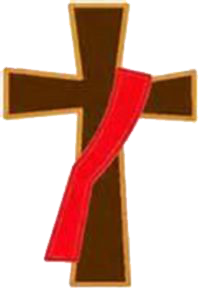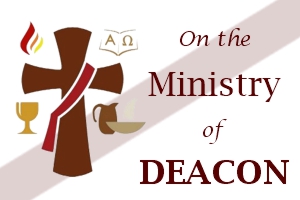
A vocational deacon is a person who personifies the servant church in the secular world. This person will already be employed (or retired from) a service-related profession — so will have that important connection of bridging the Church and the world.
Because the deacon is employed, their ministry in the church is non-stipendiary. Expenses will be determined on an individual basis, but generally include such items as gas, travel, and outreach projects. A (vocational) deacon is not seeking further ordination, is not called to be priest — it is a permanent ministry.
The ministry of (vocational) deacon is primarily a ministry of service. It exercises the ministry of Christ to those beyond the church proper by serving as a catalyst, encourager, and guide for lay members engaged in outreach ministries. Deacons also assist bishops and priests in proclaiming the Gospel message and in the administration of the Sacraments.
By word and example, deacons are to make the redemptive love of Christ known in the places in which they live, work, and worship.
Deacons, by virtue of their call, are the prophetic leaders who challenge the Church to always look beyond itself. They are the living models that illuminate Christ as the model of servanthood.
Deacons will be the leaders who have a visibility to the needy and will strengthen the servant ministry of the Anglican Church in the Diocese of Fredericton.
This ministry is carried out in five different, but interdependent, means:
a. to model servant ministry in the workplace;
b. to enable the servant ministry of the Church;
c. to witness to the Gospel by articulating to those served that this is a ministry of the whole Christian Church;
d. to interpret to the Church the needs, hopes, and concerns of the local secular community; and
e. to assist bishops and priests in the liturgical and sacramental life of the Church.
The primary responsibility for recognizing a vocation to ordained ministry lies with the parish. Discerning a call is not a private matter, but the proper concern of the entire Church.
The discernment process is essential. It is the Church itself that discerns in the individual the work of the Holy Spirit. The Church, through our Baptismal Covenant, is committed to support one another in ministry - whatever form that ministry takes. The Church, as a corporate body, must recognize, test and affirm an individual call. The first step in this process is for the individual to meet with his/her incumbent priest to ask for affirmation/ information/support. Then a PDC (parish discernment committee) is formed.
An Archdeacon will chair the first meeting that Committee. The PDC will offer a summary report to the parish corporation. The role of the PDC is clearly defined in Directive 7.1 The Parish Discernment Committee. The discernment process should not be rushed, can take up to six months, but with due diligence can be completed in three.
The rector/priest-in-charge of any parish has a critical role in guiding an inquirer to respond to God's call.
He/she is in a good position to recognize people whose gifts call them to 'servant ministry'. Because the first step in the discernment process is this initial conversation between the inquirer and rector/priest, the incumbent clergy must be supportive of the ministry of deacon.
It would be almost impossible for an inquirer to proceed without this support.
After preliminary discussions, if the incumbent clergy concludes that, indeed, this person is called, then that clergy would initiate the formation of a parish discernment committee.
The educational component is a four-part program.
1. A certificate in theological studies, available by distance education from an accredited theological institution. This includes four course units; Old Testament, New Testament, Survey of Theology and Theology/Spirituality of Ministry.
2. Tutorials offered within the diocese. These will be held as a group, to build community. Topics include The Diaconate, Liturgical Formation, Ministry of Deacons, Anglican Polity, Church History, and Sacramental Theology.
3. Clinical Pastoral Education (CPE) or other studies in pastoral and religious care.
4. Post-ordination studies, which include Prevention of Sexual Misconduct, Canons, Diocesan Policies and other pertinent topics.
Upon completion of the discernment process, the parish commendation, and application from the individual, the Inquirer moves to Aspirant status. Upon completion of the educational requirements, the Aspirant, with the Bishop's permission, moves to Postulant status.
Upon acceptance by the Bishop and the Commission on the Diaconate, the Postulant moves to Candidate status. Upon completion of pre-ordination documentation and a ministry appointment, details of the ordination are arranged. The Candidate is ordained a (vocational) deacon, and is licensed by the Bishop.
All ordinations will take place in the Cathedral. This is a diocesan event. The deacon's parish will hold their own celebrations following ordination.
from a brochure on the vocational diaconate
Diocese of Fredericton, 2009
